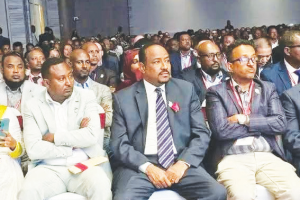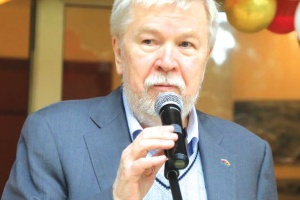
Nigerian author Ben Okri is perhaps one of the best known African writers of this generation. He is not only a novelist, poet and non-fiction writer. He is also a well-established political essayist starting from his younger years When he was a regular columnist at The NEW STATESMAN, an English magazine that leaned on the left of the political spectrum. As an African with a deep, although indirect reading of life under colonialism and neo-colonialism, Ben Okri could not surprise us for being the modern mouthpiece of African oppression and African Renaissance.
He was born in Nigeria and grew up in Britain. His writings, both fiction and non-fiction not only denounce Africa’s mistreatment and abuse by colonialists, local politicians as well as multinational companies, but also exposes the military dictatorships that have done as much damage to Africa as forces from outside the continent.
His Booker Prize winning novel “The Famished Road” is the place where Ben Okri brings to life, with minute details and clinical diagnosis the outcome of Africa’s brutalization in the hands of their own political elites under foreign rule.
The setting of “The Famished Road” is Nigeria before independence. It is a more than 500 pages verdict on the details of how Nigerians, by implications, Africans, have been impoverished and left to their own devices by abusive, brutal and selfish politicians and their hirelings whose sole interest is to sit on the back of the poor and make more money while the common men go down the drain.
“The Famished Road” is therefore the minute exposure of this process of daily brutalization, in a society deeply affected by ancestral beliefs and spiritual values expressed through invisible forces, and natural phenomena that shape their destiny. It is also the depiction of the long struggles between African traditional world view and the social distortions and dehumanization, modernization has caused on that world.
Azaro, is the hero of the novel through whom Ben Okri exposes and diagnoses not only Nigeria’s ills but also its possible redemption. The book is unlike traditional novels where conflicts and plot structures moves from one point to the next until on a linear or one-dimensional trajectory. The Famished Road is not your conventional novel of adventure you follow what happens to the hero through such devices as suspense and cliff hangers.
It is not a novel with a conventional tight-plotted narration. There is no beginning and ending like in the traditional novel form. It is a diffuse narrative where a limited number of characters (i.e. Azaro. Dad, Mum and Madame Koto) come and go in the daily life of the ghetto and live their respective destinies against the background of poverty in ghetto life. It is rather a book with a mysterious story of a ‘spirit child’ and his family that goes along a linear narrative. The technique Ben Okri uses to tell us the story of Azaro is one of super naturalism and mystery deeply en grained in traditional Nigerian societies whose basic beliefs are rooted in ancestral myths and legends.
The Famished Road is in fact a Nigerian story told in English. It is also an African novel because the characters, the issues and myths and legends are all African. The book depicted the struggle between tradition and modernity in pre-independence Nigeria where the white rulers are not visible and act indirectly through the rich elites who try to dominate with corruption and brute force perpetrated by thugs they hire with their money.
The Famished Road is a struggle between good and evil represented on the one hand by Azaro and his father and mother who are hardworking, honest, proud (Azaro’s father in particular) but whose daily efforts are robbed by the rich and the powerful and their agents like Madame Koto whose rise to preeminence in the ghetto is expedited by her joining the party of the rich.
She is in a way an agent of change in the ghetto but here rise and prominence is with her opportunism that led her to join the party of the rich. From the owner of a small drink and food joint she “rises” to become the owner of a brothel guarded and defended by hired thugs from the party of the rich. Madame Koto was a better woman as a poorer drink seller and become arrogant and abusive as she rises in wealth and power, buys a car and becomes the dominant figure in the ghetto.
On the other hand, Azaro, the spirit-child is the hero of the novel who mediates between the real and spirit worlds and symbolizes Nigeria’s struggle between her true self and the domination of colonial power and local elites that corrupt and abuse the poor neighbors and make their live one long narrative of abuse, poverty, illness and all the imaginable evil things.
Azaro is travelling between this world and the world beyond, the world of spirits and conveys messages and transmits the grievances and sufferings of the ghetto dwellers and takes the side of the poor against the rich. His extraordinary visions depict not only the Nigeria of the time but foretell future events in the form of dreams and hallucinations. In the final analysis Azaro’s role is to show how the old world of goodness is crumbling and in its place a world of greed and poverty rises as it was the case in post-independence Nigeria.
Ben Okri, the author, seems to speak to us through Azaro. In a way this is another version of the message by Chinua Achebe in “Things Fall Apart” in which we see how advent of colonialism has undermined traditional values and led to the brutalization of society through the person of Okonkwo, the hero of the novel.
Azaro’s father who has no name and is addressed simply as “Dad” depicts the struggles poor families undergo and demonstrates how poverty leads to anger and brutality. He is a hardworking, hard drinking tough guy who loves his family but is led to anger by poverty that is trapping him wherever he goes.
Dad is a rebellious and revolutionary character who chose to symbolically fight the bad guys by becoming a self-trained boxer and then a visionary who decides to lead the poor people of the ghetto to his imaginary life of freedom and plenty. Unfortunately, Dad’s dream remains simply a dream, unfulfilled but shows the way forward towards redemption for the poor in Nigeria and their liberation from abuses and exploitation by the elites. He is a courageous man who answers senseless violence and injustice with his own brand of justified struggle and succeed in imposing his will on them though for a short period of time.
Dad dreams a lot but we don’t see his dream becoming real and the schools and universities he dreams to build for the beggars of that unnamed part of the country sputters and disappears as sheer chimera although it shows the way forward to liberation from poverty and ignorance.
Mum, Dad’s wife and Azaro’s mother, is a heroic figure, the typical African women who suffers at home in the hands of her drunkard husband and he outsides world inhabited by evil doers. She takes care of her family, loves her husband despite the precarious life she leads as a street hawker with meager incomes not sufficient even to feed the family of three.
She is patient, optimistic, loving and tolerant of the unkindness of life. She loves her husband and son and struggles alongside them for a better future than never comes. She feeds her boxer husband while she eats a smaller portion from the meager family table. The three together form a fighting family that
embodies the values of honesty hardwork and kindness. They may not succeed materially but they are spiritually strong. loving and optimistic in the face of uncountable ordeals. Together they embody the better family or a better Nigeria all of them aspire for and family to see until the end of the story.
Ben Okri’s novel is not only a Nigerian story. It is also an all-African story whose characters are so close to us that we get the impression that they are living with us like our close acquaintances. In fact, at the end of the story, Dad vision transcended Nigeria society to include all of Africa and even goes beyond.
The narrative techniques of “The Famished Road” are a combination of symbolism, surrealism, magical realism and African traditional values and folk assets. Spiritualism is the basic aspect of the belief-system of African traditional societies that include gods and demons that are not only symbols of the struggle between good and evil but real presence that shape the lives and ideas and actions of most Africans for ages.
In fact, this belief, whether as a system of thoughts or as guides to action or living, have remained the key elements of debate and controversy among African intellectuals who have not yet agreed on whether Africans have a philosophy or not. Many African philosophers, including the late professor Claude Sumner, an Ethiopianist who has made an impact on the debate by asserting that there is an Ethiopian philosophy in the strict sense of the term by extension and by extension, an African philosophy worth talking about.
What Ben Okri did in “The Famished Road” is to use these beliefs, legends, symbols and dreams to produce a book of magical realism in the African tradition. This is not the first time that modern writers have used such narrative devices in order to describe the realities of their respective societies. This is a device that gives more force to their stories, more plausibility and more perspective into the thoughts, actions and lives of their characters.
Among the contemporary writers who have used magical realism in their respective works are the late Colombian author Gabrial Garcia Marquez (One Hundred Years of Solitude), Chilean Isabelle Allende (The House of the Spirits), and Salman Rushdie in “Midnights Children”, his Booker Prize winning novel as well as in his later works such as “The Satanic Verses”. Besides Ben Okri African authors like Ngugi Wa Tengo (The Wizard’s Crow) have also used elements of magical realist narration into his African stories.
Ben Okri has reinvented the African imaginative narration by going beyond realism and by embracing African story telling methods and post-modern magical realism. In fact he seems to be inspired by Latin American writers like Colombian Garcia Marquez (One Hundred Years of Solitude) and Indian-born British author Salman Rushdie (Midnight’s Children) who have given us beautiful stories of their respective societies and addressed the human condition in different ways.
The Famished Road is 25 years young and has made an impact in African literary tradition Ben Okri has produced many works of fiction and non-fiction since the publication of The Famished road that remains a monumental work 25 years after winning the most prestigious British literary Award, the Booker Prize.
The Ethiopian Herald Sunday Edition August4/ 2019
BY MULUGETA GUDETA





